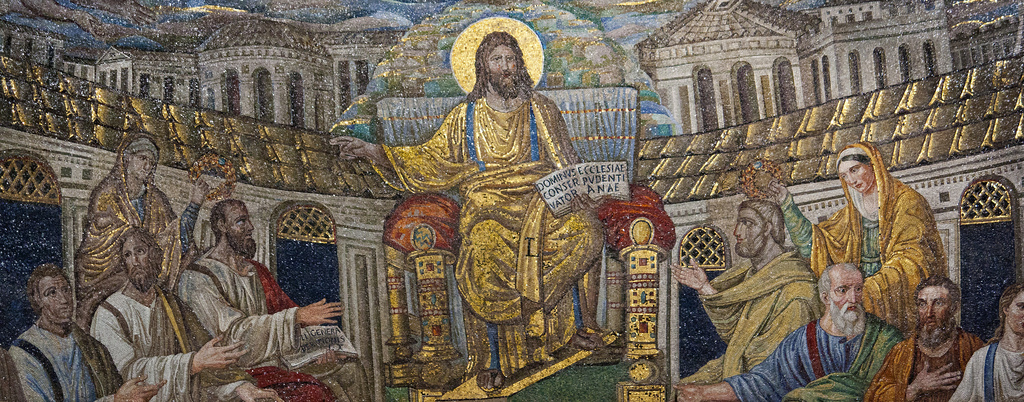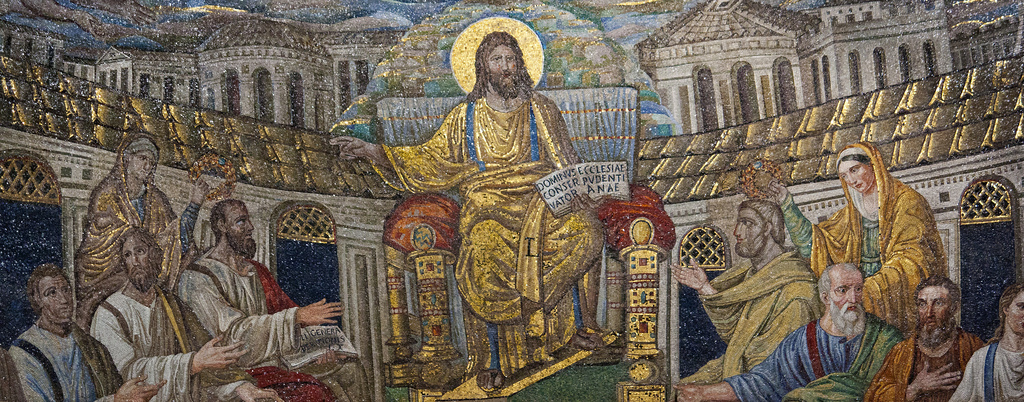依撒意亞先知書 7:10-14
那時候,上主又對阿哈次說:「你向上主、你的天主,要求一個徵兆吧!或求諸陰府深處,或求諸上天高處。」
阿哈次回答說:「我不要求,我不願試探上主。」
依撒意亞說:「達味的家族,你們聽吧!你們使人厭惡還不夠,還要使我的天主厭惡嗎?因此,吾主要親自給你們一個徵兆:看,有位貞女要懷孕生子,給他起名叫厄瑪奴耳。」
羅馬書 1:1-7
基督耶穌的僕人保祿,蒙召作宗徒,被選拔去傳天主的福音。這福音是天主先前藉自己的先知,在聖經中論及他的兒子、我們主耶穌基督,所預許的。他按肉身,是生於達味的後裔。按至聖的神性,由於他從死者中復活,被立為具有大能的天主之子。
藉著他,我們領受了宗徒職務的恩寵,為使萬民服從信德,以光榮他的聖名,其中也有你們這些蒙召屬於耶穌基督的人。
我保祿致書給一切住在羅馬,為天主所鍾愛,並蒙召為聖徒的人:願恩寵與平安,由我們的天主父,和我們的主耶穌基督,賜與你們。
瑪竇福音 1:18-24
耶穌基督的誕生是這樣的:他的母親瑪利亞,許配於若瑟後,在同居前,因聖神有孕的事,已顯示出來。她的丈夫若瑟,因是義人,不願公開羞辱她,有意暗暗休退她。
當若瑟在思慮這事時,看,在夢中,上主的天使顯現給他,說:「達味之子若瑟,不要怕,娶你的妻子瑪利亞,因為在她內受生的,是出於聖神。她要生一個兒子;你要給他起名叫耶穌,因為他要把自己的民族,由他們的罪惡中拯救出來。」
這一切事的發生,是為應驗上主藉先知所說的話:「有一位貞女,將懷孕生子,人將稱他的名字為厄瑪奴耳,意思是:天主與我們同在。」
若瑟從夢中醒來,就照上主的天使所囑咐的去做,娶了他的妻子。
將臨期第四主日的到來,意味着耶穌誕生的日子已經非常接近,而主日讀經也以這即將誕生的嬰孩為中心。教會安排了我們在這個主日聆聽瑪竇福音叙述「耶穌奧秘的身份來源」。
在福音中,若瑟接納到天使的訊息,顯示瑪利亞的兒子是天主子。耶穌受孕及出生的經過超凡神妙,正好為衪的身份及傳教工作做了詳盡的註解。保祿也論及耶穌的人性和事工:耶穌既是天主又是人,衪的降生和在世的生活顯示衪的人性;衪藉聖神的力量復活則顯示衪的天主性。總括來說,今天的讀經都指出耶穌的身份:衪是天主臨在子民中間的標記、是真天主又是真人、是來到世上救贖我們的天主子。
這些記載以雙重的方式講解這個嬰孩在世上誕生的意義。首先,天使指示若瑟給嬰孩取名為「耶穌」,並且解釋這個名字的意思就是「上主救援」,意味著這嬰孩將會是普世「萬民的拯救者」。其次,耶穌的誕生應驗了依撒意亞先知的預言:「看,一位貞女將懷孕生子,人將稱他的名字為厄瑪奴耳(意思是:天主與我們同在)。」
這個嬰孩的別名「厄瑪奴耳」尤其重要,因為整部福音的主旨就是:天主在耶穌內無時無刻地陪伴著祂的子民,拯救、幫助、和保護他們。福音的結尾更清楚地預言耶穌將會與他們「天天在一起,直到世界的終結。」(瑪28:20)
這篇默想是以 Foundations in Faith – Catechist Catechumenate Manual 為根據,並獲得版權持有人 RCL Benziger, LLC 批准使用。
Fourth Sunday of Advent (Liturgical Year A)
Isaiah 7:10-14
The Lord spoke to Ahaz, saying: Ask for a sign from the Lord, your God; let it be deep as the netherworld, or high as the sky! But Ahaz answered, “I will not ask! I will not tempt the Lord!”
Then Isaiah said: Listen, O house of David! Is it not enough for you to weary people, must you also weary my God? Therefore the Lord himself will give you this sign: the virgin shall conceive, and bear a son, and shall name him Emmanuel.
Romans 1:1-7
Paul, a slave of Christ Jesus, called to be an apostle and set apart for the gospel of God, which he promised previously through his prophets in the holy Scriptures, the gospel about his Son, descended from David according to the flesh, but established as Son of God in power according to the Spirit of holiness through resurrection from the dead, Jesus Christ our Lord. Through him we have received the grace of apostleship, to bring about the obedience of faith, for the sake of his name, among all the Gentiles, among whom are you also, who are called to belong to Jesus Christ;
to all the beloved of God in Rome, called to be holy. Grace to you and peace from God our Father and the Lord Jesus Christ.
Matthew 1:18-24
This is how the birth of Jesus Christ came about. When his mother Mary was betrothed to Joseph, but before they lived together, she was found with child through the Holy Spirit. Joseph her husband, since he was a righteous man, yet unwilling to expose her to shame, decided to divorce her quietly. Such was his intention when, behold, the angel of the Lord appeared to him in a dream and said, “Joseph, son of David, do not be afraid to take Mary your wife into your home. For it is through the Holy Spirit that this child has been conceived in her. She will bear a son and you are to name him Jesus, because he will save his people from their sins.”
All this took place to fulfill what the Lord had said through the prophet: Behold, the virgin shall conceive and bear a son, and they shall name him Emmanuel, which means “God is with us.”
When Joseph awoke, he did as the angel of the Lord had commanded him and took his wife into his home.
The Fourth Sunday of Advent brings us closer to the coming birth of our Lord. Reflected in this Sunday's readings is the passage from the Gospel of Matthew that revealed the mysterious origin and the identity of Jesus.
In today's Gospel, Joseph receives the message from the angel that this son of Mary is conceived by the Holy Spirit. St. Paul, in his letter to the Romans, pronounces that this son is both God and man. According to the flesh He is descended from David, yet His resurrection from the dead is through the divine power of God. In summary, all of today's readings reveal to us who Jesus is. He is God's presence among His people. As true God and true man, Jesus the Son of God, has come to save us.
The significance of the birth of this infant is revealed in two ways. Firstly, in the instruction of the angel to Joseph in naming the child "Jesus", which means "God saves", that he will be the "saviour of all". Second is the fulfillment of the prophecy of Isaiah: “The virgin shall conceive and bear a son, and shall name him Emmanuel, (meaning 'God is with us')."
The name "Emmanuel" is especially important for through Jesus, God is always with His people, as Jesus Himself says at the end of the Gospel "I am with you always, until the end of the age." (Matt 28: 20)
This material is adapted from the Foundations in Faith – Catechist Catechumenate Manual with the permission of the copyright holder, RCL Benziger, LLC.

